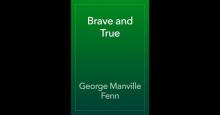


Brave and True
George Manville Fenn

Produced by Nick Hodson of London, England
Brave and True,Short stories for children by G M Fenn and others.________________________________________________________________________
Although Fenn's name appears on the cover, and on the title-page, hedoes not appear to have written more than one of the stories, and thestory that gave its name to the book was not by him. There are severalstories that were not signed by an author's name, so we have a mysterythere. They were probably just using Fenn's name to sell the book.
The target audience appears to be seven- or eight-year-olds; certainlynot the sixteen-year-olds that Fenn generally aimed for. There aretwelve items, three of which are rather trivial "poems". The nine shortstories all have the theme "Brave and True", and vary in their settingsfrom small boarding-schools in the Home Counties, to the RockyMountains.
We had originally intended to produce this book merely as a pdf (whichis of course still available), but with an effort of will we managed tomake an xhtml book of it, though this does not have all the delightfullittle line drawings that appeared throughout the eighty pages of thebook.
It is possible that the principal merit of this book is the way itthrows light on the lives of the younger boarding-school boys and girlsof the nineteenth century, particularly eight to thirteen year-oldboys. I can tell you that not a lot had changed by the time I wasat such a school, less than fifty years later. Even the Eton collarand the bum-freezer jacket was familiar to me!NH________________________________________________________________________
BRAVE AND TRUE--SHORT STORIES FOR CHILDREN BY G M FENN AND OTHERS
CHAPTER ONE.
BRAVE AND TRUE, BY E DAWSON.
"But I say, Martin, tell us about it! My pater wrote to me that you'ddone no end of heroic things, and saved Bullace senior from beingkilled. His pater told him, so I know it's all right. But wasn't it ajoke you two should be on the same ship?"
Martin looked up at his old schoolfellow. He had suddenly become aperson of importance in the well-known old haunts where he had learnedand played only as one of the schoolboys.
"It wasn't much of a joke sometimes," said he. "I thought at first thatI was glad to see a face I knew. But there were lots of times afterthat when I _didn't_ think it."
"Wasn't old Bullfrog amiable, then?"
"He was never particularly partial to me, you know," answered Martin."The first term I was at school--before you came--I remember I caughthim out at a cricket match. He was always so sure of making top score!He called me an impudent youngster in those days."
"He never was too good to you, I remember. I was one of the chaps helet alone."
"Well, he went on calling me an impudent youngster," continued Martin,"and all that sort of thing--and he tried to set the other fellowsagainst me. Oh, it isn't all jam in the Royal Navy! You haven't leftschool when you go _there_, and the gunroom isn't always just exactlyparadise, you know! And if your seniors try to make it hot for you,why--they can!"
"So you and Bullfrog didn't exactly hit it off?"
"Oh, well, he was sub-lieutenant this last voyage, and you can't standup to your senior officer as you can to your schoolfellows, don't yousee?"
There was a minute's silence, broken by an eager request. "But tell usabout the battle. What did it feel like to be there? How was it oldBullfrog let you go at all?"
"He hadn't the ordering of _that_, thank goodness," said Martinfervently. "And I was jolly glad he hadn't! We had some excitementgetting those big guns along, I can tell you! The roads weren't justlaid out for that game."
"Well, go on," said another eager voice. "Then one day we came upon theenemy, and there was a stand-up fight, you know. How did it feel?Well, there wasn't much thinking about it. You just knew that you wereready to blaze at them, and they were popping at you from theirentrenchments; and that you jolly well meant to give them the worst ofit."
"Well, about Bullfrog?"
"Oh, that was nothing," said Martin, reddening. "He must have gotexcited or something, for he took a step forward, putting himself infull view, and just then I saw what he didn't see--that there were someof those Boer beggars just under our kopje, and that one of them hadraised his rifle to pick off Bullfrog. So I made a flying leap on tohis back and knocked him flat, and the bullet that was meant for himjust crossed the back of my coat and ripped it up. Didn't even scratchme!"
The little knot of listeners around Martin waited with bated breath formore.
"But he didn't escape scot-free after all," continued Martin. "Tenminutes after that he got shot in the leg. The bone was fractured, andhe couldn't move. I saw him fall and I pulled him to a little hollowunder a stone where he'd be safe. And it was just as well, for thecavalry came up over there when the chase began. We gave them thelicking they deserved that day. But you know all about that."
"Wish I'd been you!" said Martin's old schoolfellow very enviously."But what about Bullfrog after that?"
"He was taken in the ambulance-cart and put in hospital. I saw himthere and he was getting on all right."
"And what did he say?"
"He said I'd caught him out again and a lot more. But it was allnonsense, you know."
"I expect he was sorry he'd ever made it hot for you," said one of thelisteners.
"You ought to have a VC or something for it, _I_ consider," saidanother.
"Rot!" answered Martin. "If a schoolfellow and a shipmate of yourswanted a push out of danger, wouldn't you give it him? And you wouldn'tthink yourself a hero either!"
"Other people might, though," answered Martin's old schoolfellow.














